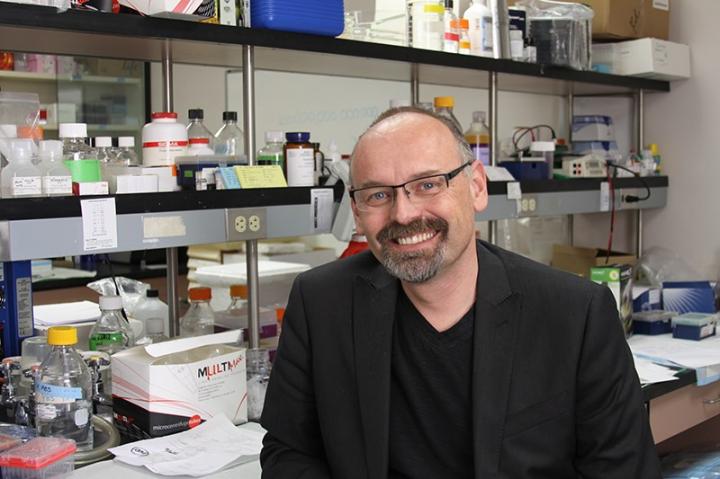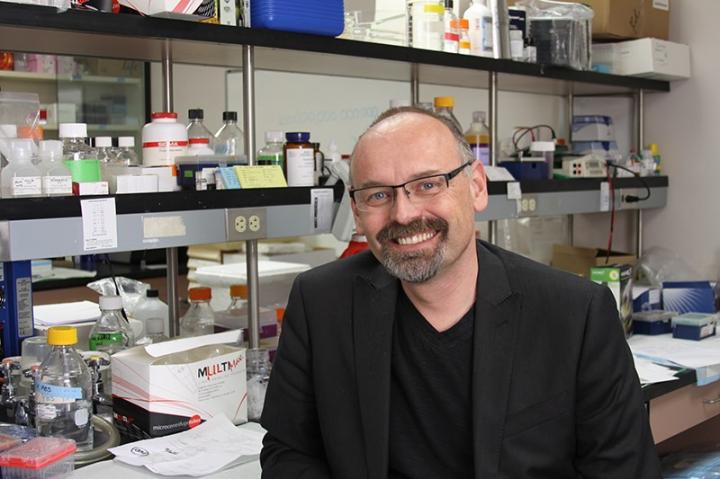
Credit: University of Arizona Health Sciences
TUCSON, Ariz. – The University of Arizona Steele Children's Research Center has been awarded a five-year, $1.73 million grant from the National Institutes of Health to determine what triggers autoimmune disease.
Approximately 24 million Americans suffer from about 80 different autoimmune diseases, such as type 1 diabetes, celiac disease, inflammatory bowel disease, autoimmune encephalopathy, rheumatoid arthritis and lupus, among others. Autoimmune disease prevalence and incidence rates are on the rise in the Western world.
Autoimmune disease develops when the body's immune system produces an immune response against healthy cells rather than attacking pathogens to defend against disease.
This novel research study will be led by principal investigators Pawel Kiela, DVM, PhD, associate professor with the Department of Pediatrics and the Steele Center, and Fayez K. Ghishan, MD, professor and head, Department of Pediatrics, and director of the Steele Center.
"In this study, we essentially are asking what happens during the very early stages of an autoimmune disease," Kiela said. "How does autoimmune disease develop?"
"The UA has always had reason to be incredibly proud of the Steele Children's Research Center and the dedication of its researchers and staff to improve health and save lives in our region as one of the many Centers of Excellence at the UA," said UA President Ann Weaver Hart. "This new grant will support the continuing work of Drs. Kiela and Ghishan as they help shape our understanding of autoimmune diseases. Their efforts could potentially benefit many people around the world, and I am very grateful for their dedication and the support of the NIH."
"This prestigious NIH grant awarded to the UA Steele Center at the University of Arizona Health Sciences bolsters our efforts to positively impact health care. Millions of people who are living with autoimmune diseases, and those who may be at risk for developing one, will be helped by the discoveries that Drs. Kiela and Ghishan will make about the mechanisms that trigger these often debilitating conditions," said Joe G.N. "Skip" Garcia, MD, UA senior vice president for health sciences, the Dr. Merlin K. DuVal Professor of Medicine and a member of the prestigious National Academy of Medicine.
Drs. Kiela and Ghishan's research focuses on the autoimmune disease inflammatory bowel disease, or IBD, which includes Crohn's disease and ulcerative colitis–debilitating chronic autoimmune disorders of the gut.
The study will explore the role of immune cells known as dendritic cells, or DCs, specialized cells of the immune system. They make the immune system "tolerate" harmless antigens, which is necessary to keep the body from making an immune attack on itself. This is known as "immune tolerance." DCs also instruct the immune system to respond to and destroy foreign pathogens.
The UA researchers are curious about what triggers DCs to launch an immune response against normal cells–resulting in autoinflammatory disease–rather than maintaining tolerance.
One of the stimuli known to provide this environment in which the DCs promote tolerance is a protein called transforming growth factor beta, or TGFβ. This protein is responsible for dampening the immune responses by DCs and T-lymphocytes, keeping them in a tolerance-promoting state. It also facilitates resolution of an inflammatory response.
Drs. Kiela and Ghishan hypothesize that DCs exposed to microbial factors develop resistance to TGFβ, which in turn promotes autoinflammatory disease like IBD. This may involve normal or pathogenic bacteria, which may get across a damaged barrier in the gut. Thus, TGFβ resistence in DCs may represent an important triggering mechanism in the development of chronic, relapsing inflammation, especially in people with genetic predispositions.
"Our work will address a physiologically and clinically important, yet unexplored, phenomenon of TGFβ resistance acquired by activated dencritic cells. We hope to identify the molecular and cellular mechanisms responsible, and describe the consequences of such resistance in the context of autoimmune disorders," Dr. Ghishan said.
Dr. Kiela further explained this research is relevant not just to IBD, but to many other autoimmune diseases that impact millions of individuals.
"We hope that mapping the pathway that leads to TGFβ resistance in activated dendritic cells will identify new targets for potential therapautic approaches that could restore tolerance in patients with autoimmunity or for disease prevention in patients with clear genetic predisposition," Dr. Kiela said.
###
This research is supported by the National Institute of Diabetes and Digestive and Kidney Diseases of the National Institutes of Health under Award No. R01DK109711.
About the UA Steele Children's Research Center
The UA Steele Children's Research Center is one of the prestigious Centers of Excellence at the UA College of Medicine – Tucson at the University of Arizona Health Sciences. It is the state's only academic pediatric research center designated by the Arizona Board of Regents, and the only facility in Southern Arizona where researchers and physician-scientists are dedicated to advancing medical knowledge through basic and translational research to improve children's health. As researchers, they seek to discover answers to children's medical mysteries. As physician-scientists, they provide compassionate care to hospitalized patients at Banner Children's at Diamond Children's Medical Center and pediatric outpatient clinics throughout Tucson and the state. And, as faculty members with the UA Department of Pediatrics, they teach and train the next generation of pediatricians and researchers.
About the University of Arizona Health Sciences
The University of Arizona Health Sciences is the statewide leader in biomedical research and health professions training. The UA Health Sciences includes the UA Colleges of Medicine (Phoenix and Tucson), Nursing, Pharmacy and Mel and Enid Zuckerman College of Public Health, with main campus locations in Tucson and the growing Phoenix Biomedical Campus in downtown Phoenix. From these vantage points, the UA Health Sciences reaches across the state of Arizona and the greater Southwest to provide cutting-edge health education, research, patient care and community outreach services. A major economic engine, the UA Health Sciences employs almost 5,000 people, has nearly 1,000 faculty members and garners more than $126 million in research grants and contracts annually. For more information: http://uahs.arizona.edu (Follow us: Facebook | Twitter | YouTube | LinkedIn)
Media Contact
Darci Slaten
[email protected]
520-626-7774
http://uahs.arizona.edu/
############
Story Source: Materials provided by Scienmag





